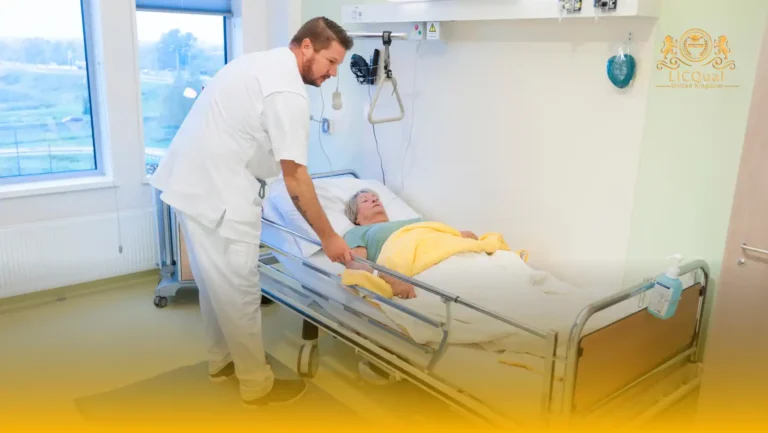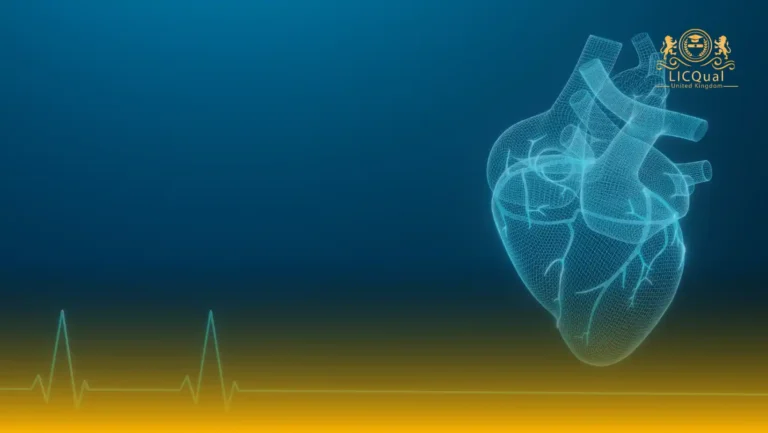The LICQual Level 3 Certificate in Nutritional Health Promotion (Cert Health Promotion) is a comprehensive qualification designed for individuals seeking to advance their knowledge and expertise in promoting nutritional wellbeing. This course equips learners with the skills required to understand the principles of health promotion, the role of nutrition in disease prevention, and strategies to encourage healthier lifestyle choices within communities and professional settings.
This qualification is particularly suited to professionals who wish to enhance their career prospects, expand their practical understanding, and strengthen their Continuing Professional Development (CPD). By exploring evidence-based approaches to nutrition, learners will gain the confidence to implement effective health promotion strategies and contribute positively to public health initiatives.
Centres delivering this qualification are expected to meet high standards by ensuring that all training is delivered by competent and qualified staff. Additionally, centres must provide the necessary materials, resources, and support to guarantee an effective learning experience and successful outcomes for every learner.
By completing this course, learners will be better prepared to take on advisory or supportive roles in health, nutrition, and wellness-related fields. The programme also provides a strong foundation for further study and professional growth, enabling learners to make a meaningful impact in promoting healthier communities and advancing their careers.
Course Overview
Qualification Title
LICQual Level 3 Certificate in Nutritional Health Promotion (Cert Health Promotion)
Total Units
6
Total Credits
24
GLH
120
Qualification #
LICQ2201024
Qualification Specification
To enroll in the LICQual Level 3 Certificate in Nutritional Health Promotion (Cert Health Promotion) , applicants must meet the following criteria:
|
Qualification# |
Unit Title |
Credits |
GLH |
|---|---|---|---|
|
LICQ2201024-1 |
Principles of Nutrition and Health |
4 |
20 |
|
LICQ2201024-2 |
Foundations of Health Promotion |
4 |
20 |
|
LICQ2201024-3 |
Nutrition and Lifestyle-Related Diseases |
4 |
20 |
|
LICQ2201024-4 |
Community Nutrition and Public Health Interventions |
4 |
20 |
|
LICQ2201024-5 |
Behaviour Change and Communication Strategies |
4 |
20 |
|
LICQ2201024-6 |
Research and Professional Practice in Nutritional Health Promotion |
4 |
20 |
By the end of this course, learners will be able to:
Unit 1: Principles of Nutrition and Health
By the end of this unit, the learner will be able to:
- Explain the structure and function of carbohydrates, proteins, fats, vitamins, and minerals in maintaining health
- Describe the processes of digestion, absorption, and metabolism of nutrients
- Assess the impact of nutritional imbalances on overall health and wellbeing
- Apply nutritional guidelines to support healthy lifestyle choices
Unit 2: Foundations of Health Promotion
By the end of this unit, the learner will be able to:
- Define the key principles and objectives of health promotion
- Compare different models and approaches used in health promotion
- Analyse the role of nutrition in promoting health at individual and community levels
- Apply strategies to promote positive health behaviours through nutrition
Unit 3: Nutrition and Lifestyle-Related Diseases
By the end of this unit, the learner will be able to:
- Identify major lifestyle-related diseases influenced by nutrition, including obesity, diabetes, cardiovascular disease, and cancer
- Explain the nutritional risk factors associated with chronic diseases
- Evaluate the role of diet in prevention, management, and rehabilitation of these conditions
- Recommend nutritional strategies to reduce the risk of lifestyle-related diseases
Unit 4: Community Nutrition and Public Health Interventions
By the end of this unit, the learner will be able to:
- Explain the importance of community-based nutrition programmes in public health
- Design simple, evidence-based interventions to promote nutritional health in different populations
- Assess the effectiveness of public health nutrition campaigns and initiatives
- Apply ethical and cultural considerations when delivering nutrition interventions
Unit 5: Behaviour Change and Communication Strategies
By the end of this unit, the learner will be able to:
- Explain key behaviour change theories relevant to nutrition and health promotion
- Apply effective communication strategies to influence healthier food choices
- Evaluate barriers and motivators to adopting healthier eating habits
- Use appropriate tools and resources to support nutrition-related behaviour change
Unit 6: Research and Professional Practice in Nutritional Health Promotion
By the end of this unit, the learner will be able to:
- Explain the importance of research in advancing nutritional health promotion practices
- Apply basic research methods to investigate a nutrition-related issue
- Demonstrate professional, ethical, and reflective practice in nutritional health promotion
- Develop an action plan for personal and professional development in the field
The LICQual Level 3 Certificate in Nutritional Health Promotion (Cert Health Promotion) is perfect for anyone interested in enhancing their knowledge of nutrition, health promotion, and wellness. This course is ideal for aspiring health professionals, wellness coaches, community workers, and individuals looking to improve personal or public health outcomes. It provides practical, evidence-based skills that can be applied in professional or personal settings.
1. Aspiring Nutrition and Health Professionals
- Gain foundational knowledge in nutrition science and health promotion
- Learn practical strategies for diet planning and wellness programs
- Understand community health needs and interventions
- Develop skills for professional nutrition consultation
- Prepare for advanced nutrition or health promotion certifications
- Build credibility in the health and wellness sector
2. Fitness Trainers and Wellness Coaches
- Integrate nutrition and lifestyle advice into client programs
- Apply health promotion strategies to improve client wellbeing
- Learn evidence-based metabolic and dietary approaches
- Support weight management and healthy lifestyle goals
- Enhance professional skills and client outcomes
- Stay updated on current nutrition and health trends
3. Healthcare Practitioners and Support Staff
- Expand knowledge in nutritional health and wellness
- Apply nutrition strategies to patient care
- Understand public health and community nutrition principles
- Gain skills in health promotion and education
- Improve patient lifestyle management
- Enhance career prospects with a recognized Level 3 certificate
4. Community and Public Health Workers
- Promote healthy eating and lifestyle habits in communities
- Educate groups about nutrition and wellness strategies
- Design and implement local health programs
- Support long-term community health improvements
- Build confidence in public health interventions
- Apply practical skills to real-world scenarios
5. Students and Career Changers
- Explore opportunities in nutrition, wellness, and public health careers
- Gain an accredited Level 3 certification for your CV
- Learn practical, transferable skills for professional growth
- Prepare for advanced courses in health and nutrition
- Develop a strong foundation in evidence-based health promotion
- Access flexible online learning for busy schedules
6. Corporate Wellness and Lifestyle Coaches
- Enhance workplace wellness initiatives with nutrition knowledge
- Support employee health and productivity
- Implement nutrition and lifestyle programs at work
- Promote long-term healthy habits among staff
- Gain a recognized certification to boost professional credibility
- Apply practical health promotion strategies in corporate settings
7. Individuals Seeking Personal Health Knowledge
- Learn how to manage personal nutrition and wellbeing
- Understand lifestyle changes to improve metabolic health
- Gain insight into weight management and dietary planning
- Apply evidence-based strategies for daily life
- Build confidence in making healthy choices
- Improve overall health and quality of life
Centres offering the LICQual Level 3 Certificate in Nutritional Health Promotion (Cert Health Promotion) must meet the following requirements to ensure high-quality delivery and learner success:
- Qualified and Competent Staff: Centres must have trainers and assessors with relevant qualifications and industry experience in nutrition, health promotion, or public health.
- Access to Learning Resources: Centres should provide up-to-date learning materials, reference texts, digital resources, and research tools to support learner development.
- Appropriate Facilities: Centres must have suitable classrooms, training spaces, and access to technology for interactive learning and assessments.
- Assessment Capabilities: Centres are required to use valid and reliable assessment methods, ensuring fair opportunities for all learners.
- Learner Support Services: Centres should provide academic guidance, feedback, and access to support services to help learners achieve their full potential.
- Quality Assurance Systems: Robust internal quality assurance procedures must be in place to maintain assessment standards and compliance with awarding body requirements.
- Commitment to CPD: Teaching staff should engage in Continuing Professional Development (CPD) to stay updated with current practices in nutrition and health promotion.
- Compliance with Policies: Centres must adhere to all relevant policies on equality, diversity, inclusion, and learner safeguarding.
Assessment and Verification
All units within this qualification are subject to internal assessment by the approved centre and external verification by LICQual. The qualification follows a criterion-referenced assessment approach, ensuring that learners meet all specified learning outcomes.
To achieve a ‘Pass’ in any unit, learners must provide valid, sufficient, and authentic evidence demonstrating their attainment of all learning outcomes and compliance with the prescribed assessment criteria. The Assessor is responsible for evaluating the evidence and determining whether the learner has successfully met the required standards.
Assessors must maintain a clear and comprehensive audit trail, documenting the basis for their assessment decisions to ensure transparency, consistency, and compliance with quality assurance requirements.







